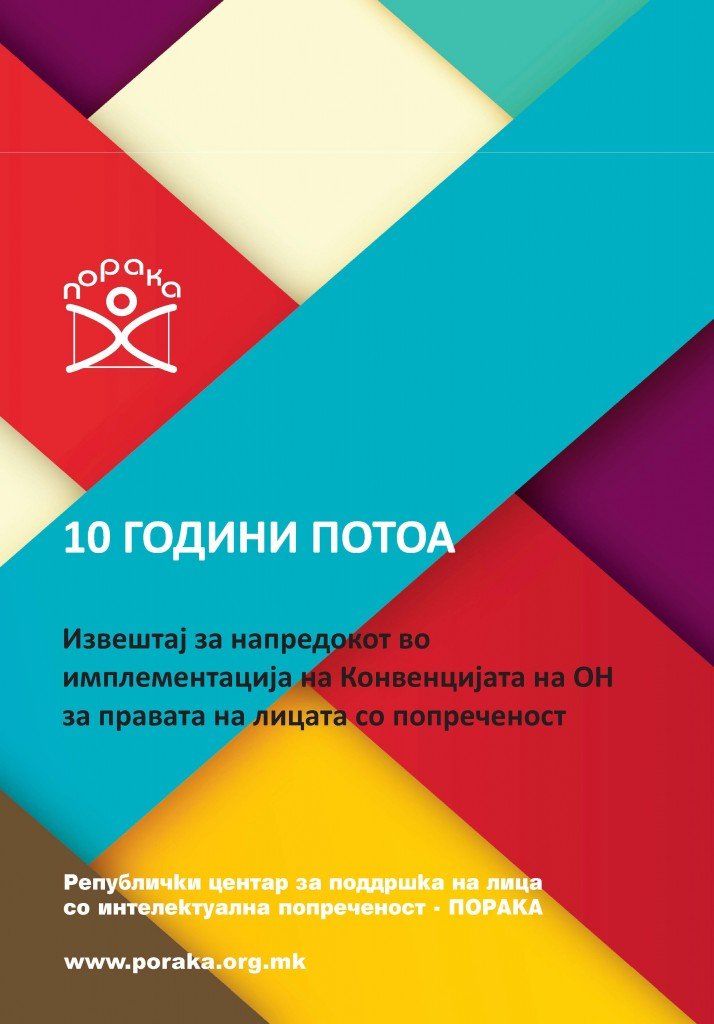In December 2011, led by the human aspects and benefits offered by the Convention, all Members of the Parliament then, unanimously, without reservations, passed the Law on Ratification of the Convention and pledged the state to incorporate this international treaty into the national legislation.
10 years have passed since the ratification of the UN Convention on the Rights of Persons with Disabilities by The Republic of North Macedonia. In December 2011, led by the human aspects and benefits offered by the Convention, all Members of the Parliament then, unanimously, without reservations, passed the law on Ratification of the Convention and pledged the state to incorporate this international treaty into the national legislation. Having the force of a law that guarantees all human rights for persons with disabilities on an equal basis with others, the Convention has become the most important human rights treaty for persons with disabilities, which must be respected and properly implemented by national and local authorities.
The purpose of this report is to answer the question whether the state has remained consistent in its commitment to implement the Convention, the Executive Office of the Republic Centre – PORAKA conducted a survey in the second half of 2021 in order to determine what and how much has been achieved for advancement of the rights of persons with intellectual disability in the past 10 years since the ratification of the Convention. Therefore, a combined approach has been used in gathering the necessary information and data, i.e., desktop analysis and focus groups with relevant stake holders:
- Comparative review of the legislation, policies, programmes, reports from relevant institutions that contributed towards advancing the rights of persons with intellectual disability in the past 10 years since the ratification of the Convention,
- Focus groups with representatives of state institutions, associations, persons with intellectual disability and parents.
As a result of the research, the Republic Centre – PORAKA prepared a report regarding the progress in the implementation of the UN Convention on the Rights of Persons with Disabilities “10 Years Later”, which is consisted of comparative review of the most significant changes in the past decade since the ratification of the Convention, as well as recommendations for advancing the rights of persons with intellectual disabilities. Authors of the report are Vasilka Dimoska De Jong, MD and Vlado Krstovki, MA.
The report “10 Years later” was officially promoted at the central event for observing 3 December, the International Day of Persons with Disabilities, on the theme: “Leadership and participation of persons with disabilities towards an inclusive, accessible and sustainable post-COVID-19 world”, which was held by the National Coordinative Body for implementation of the UN Convention on the Rights of Persons with Disabilities and the National Council of Disability organizations in Macedonia at the Government of the Republic of North Macedonia.
The Secretary General of the Republic centre – PORAKA, Vasilka Dimoska De Jong, MD, in her speech at the central event pointed out the most significant changes in the past 10 years since the ratification of the UN Convention on the Rights of Persons with Disabilities, which are explained in more detail in the text of the report:
- The recognition of the human rights of persons with intellectual disability and their acceptance as equal citizens in society has increased. Progress has been made in raising public awareness regarding the rights of persons with disability, i.e., the level of prejudice and their labelling has been reduced. Disability is increasingly seen as a human rights issue.
- The process of creating a system of functional assessment of children and youth with disabilities has started, in accordance with the International Classification of Functioning, Disability and Health (ICF) of the World Health Organization.
- The framework for protection against discrimination has been improved through the new law on Prevention and protection against Discrimination.
- Positive changes are evident in the social protection – new rights and increased benefits are provided for persons with intellectual disability. It is especially important that persons with severe and profound intellectual disability over 26 years of age, finally in 2019, were legally identified as potential beneficiaries of the disability allowance in 2019.
- There is evident progress in the area field of social services, but there is still a need to improve the quality of the existing services, their upgrade is needed in order to better meet the needs, better distribution at regional/local level, as well as the development of new types of services, which are outlined in the improved legal framework. It is necessary for the civil sector to be accepted as equal partner of the state in the whole process.
- Significant progress has been achieved in the development of inclusive education by adopting the new Law on Primary Education and the Concept for Inclusive Education, as a basis for encouraging and finally truly starting the process of educational inclusion in a positive direction. Also, a big step forward is the initiative for employing 500 educational assistants who will be supporting children with special educational needs in regular schools in the school years 2021/2022. The effectiveness of this initiative will be subject to further evaluation.
- The situation on the field of employment has remained unchanged in the past decade since the ratification of the Convention, i.e., the model of employing persons with intellectual disability in sheltered workshops is still dominant. A completely new Law on Employment of Persons with Disabilities is being drafted, which is expected to bring significantly better solutions: introduction of a quota system a professional rehabilitation, introduction of the supported employment model and better opportunities for employment in the open labour market.





